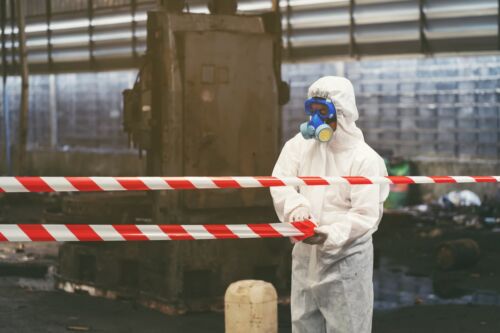



Many Americans face serious health risks from exposure to toxic chemicals on the job. People who are most vulnerable to exposure to toxic chemicals at work are those who work in industries that use hazardous substances like solvents, pesticides, asbestos, lead, and certain cleaning agents. Prolonged or unprotected exposure can cause severe, long-term, life-threatening injuries, including cancer, neurological disorders, and chronic lung disease.
If you were injured because of toxic exposure to chemicals at work and experienced permanent disability, permanent wage loss, or lost significant time from work, or if your claim for worker’s compensation benefits was denied, the Wisconsin worker’s compensation attorney team at Kingree Law Firm can help. Led by founding attorney Luke Kingree, we are a premier worker’s compensation law firm in Wisconsin that exclusively represents injured workers in claims for worker’s comp benefits. We primarily handle cases outside of the Milwaukee area and have earned a reputation as one of the top worker’s comp firms in the state.
In the Wisconsin worker’s compensation system, claims for benefits caused by toxic chemical exposure at work fall under the broader category of occupational injuries. These are injuries caused by repeated exposure to a work-related hazard, as opposed to a single specific accident or traumatic event.
Occupational diseases are compensable injuries under Wisconsin worker’s compensation law. They include any physical or mental harm caused by work-related exposure to a hazardous substance, condition, or activity. Examples of compensable occupational diseases include:
Claims for worker’s compensation benefits caused by toxic chemical exposure at work often hinge on (1) proving the worker’s disease was caused by workplace conditions rather than some other outside factor, and (2) correctly identifying the ‘date of injury.’
Often, the greatest difficulty in claims for worker’s compensation benefits for injuries caused by toxic chemical exposure at work is establishing that the injuries or medical conditions were caused by the work environment. Expert testimony is often required. The worker’s compensation attorney team at Kingree Law Firm frequently works with experts to prove an occupational disease was caused by toxic chemical exposure at work.
The statute of limitations for filing a claim for worker’s compensation benefits in Wisconsin is 12 years from the date of injury. However, claims for diseases caused by toxic chemical exposure at work can be complicated because determining the ‘date of injury’ is not always straightforward. The ‘date of injury’ is often defined as the date the injured worker first knew or should have known their symptoms or disease was caused by their job. This might be the day a medical provider told them their diagnosis was caused by toxic chemical exposure at work, the date their symptoms became severe enough to interfere with work, or the last day the worker was exposed to toxic chemicals in the workplace.
Under Wisconsin law, there is no minimum period of exposure or time at work before a condition can be considered an occupational disease. The law only requires that job duties be a materially contributing factor in the onset or progression of the condition. If you believe your job duties contributed to a severe and debilitating medical condition, you should contact an attorney who can explain your rights and help you evaluate your options.
Even if your employer took precautions to prevent exposure to toxic chemicals at work, you may still be entitled to worker’s compensation benefits. The Wisconsin worker’s compensation system is not fault-based, and you do not need to prove your employer was negligent. You only need to show that your injuries were caused by toxic chemical exposure at work.
If you believe your injuries were caused by toxic exposure to chemicals at work, obtaining appropriate medical care is paramount. A doctor can evaluate your condition and provide a treatment plan. You should also notify your employer of your injuries. Under Wisconsin law, you have 30 days to notify your employer of any injury at work, and it is best to report an injury sooner rather than later.
Kingree Law Firm is committed to providing high-quality legal representation in Wisconsin worker’s compensation claims. Contact Kingree Law Firm today to schedule an appointment to discuss your situation and how we can assist you.
© 2025 Kingree Law Firm, S.C.
| View Our Disclaimer | Privacy Policy
Law Firm Website Design by The Modern Firm